考研英语语法大全【高分必备】
考研英语语法总结(完美版)
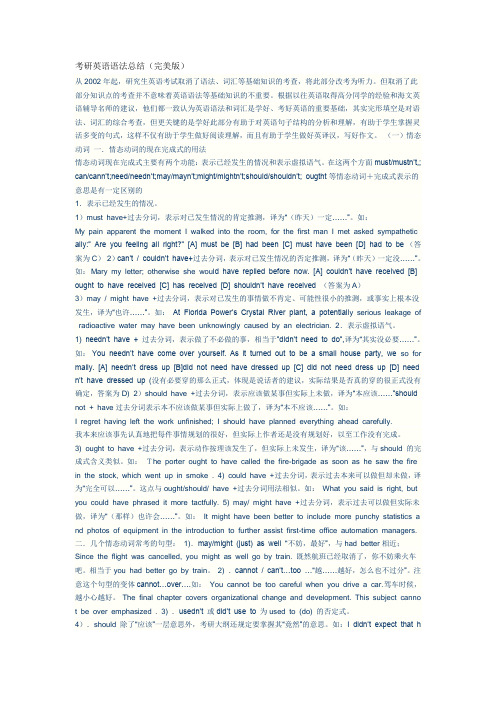
考研英语语法总结(完美版)从2002年起,研究生英语考试取消了语法、词汇等基础知识的考查,将此部分改考为听力。
但取消了此部分知识点的考查并不意味着英语语法等基础知识的不重要。
根据以往英语取得高分同学的经验和海文英语辅导名师的建议,他们都一致认为英语语法和词汇是学好、考好英语的重要基础,其实完形填空是对语法、词汇的综合考查,但更关键的是学好此部分有助于对英语句子结构的分析和理解,有助于学生掌握灵活多变的句式,这样不仅有助于学生做好阅读理解,而且有助于学生做好英译汉,写好作文。
(一)情态动词一.情态动词的现在完成式的用法情态动词现在完成式主要有两个功能:表示已经发生的情况和表示虚拟语气。
在这两个方面must/mustn’t,; can/cann’t;need/needn’t;may/mayn’t;might/mightn’t;should/shouldn’t; ougtht等情态动词+完成式表示的意思是有一定区别的1.表示已经发生的情况。
1)must have+过去分词,表示对已发生情况的肯定推测,译为“(昨天)一定……”。
如:My pain apparent the moment I walked into the room, for the first man I met asked sympathetic ally:” Are you feeling all right?” [A] must be [B] had been [C] must have been [D] had to be (答案为C)2)can’t / couldn’t have+过去分词,表示对已发生情况的否定推测,译为“(昨天)一定没……”。
如:Mary my letter; otherwise she woul d have replied before now. [A] couldn’t have received [B] ought to have received [C] has received [D] shouldn’t have received (答案为A)3)may / might have +过去分词,表示对已发生的事情做不肯定、可能性很小的推测,或事实上根本没发生,译为“也许……”。
考研英语句式
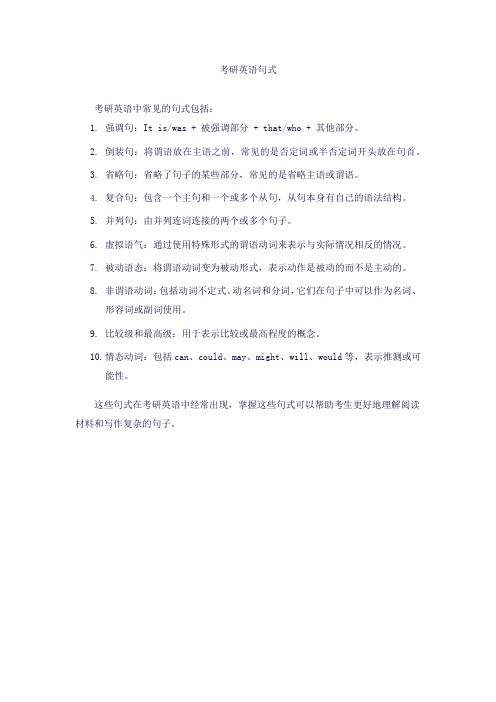
考研英语句式
考研英语中常见的句式包括:
1.强调句:It is/was + 被强调部分 + that/who + 其他部分。
2.倒装句:将谓语放在主语之前,常见的是否定词或半否定词开头放在句首。
3.省略句:省略了句子的某些部分,常见的是省略主语或谓语。
4.复合句:包含一个主句和一个或多个从句,从句本身有自己的语法结构。
5.并列句:由并列连词连接的两个或多个句子。
6.虚拟语气:通过使用特殊形式的谓语动词来表示与实际情况相反的情况。
7.被动语态:将谓语动词变为被动形式,表示动作是被动的而不是主动的。
8.非谓语动词:包括动词不定式、动名词和分词,它们在句子中可以作为名词、
形容词或副词使用。
9.比较级和最高级:用于表示比较或最高程度的概念。
10.情态动词:包括can、could、may、might、will、would等,表示推测或可
能性。
这些句式在考研英语中经常出现,掌握这些句式可以帮助考生更好地理解阅读材料和写作复杂的句子。
[研究生入学考试]考研英语语法
![[研究生入学考试]考研英语语法](https://img.taocdn.com/s3/m/1dc67bd8f705cc175527093b.png)
背诵三四十篇文章,建立在语法很清楚的基础上。
核心1)句子的基本成分分析2)非谓语动词3)从句词法概述词性按词义、词形及在句子中的功能可分为十大类1)名词:表示人或事物的名称,英文缩写n。
2)代词:代替名词或是数词(没见过)英文缩写pron。
要搞清指代对象;个别情况下可以指代一个句子(it that this),在非限定性定语从句里(as witch)也可以指代句子;(one ones)也可作代词,只带前面的名词,分别指带前面名词的(单数和复数)3)形容词:标示人或是事物的性质和特征,adj 或a。
(比较级或是最高级)4)副词:修饰动词、形容词、或是其他副词,adv或ad。
5)数词:标示数量或顺序,num。
6)动词:标示动作和状态(及物动词、不及物动词)7)冠词:标示名词的泛指或特指,art。
A、an表示不特定the标示特定的8)介词:标示名词或代词与其他词的关系,prep。
(主要用在名词或是代词的前面)9)连词:连接词与词、短语与短语、或句子与句子,conj。
10)感叹词:interj。
主要从含义,词形,句法功能上区分句法的概述句子的成分:主语、谓语、宾语、系动词、表语等句子的成分分为两种1)组成句子的基本元素:除了下面两者都是基本成分2)附加成分:定语、状语(却两者是句子是完整的【剩余的为主干】,只是意思不完整)主语:标示描述的是“谁”“或什么”(名词、代词、或与之相应的短语或句子担任)谓语:说明主语的动作和所处的状态,由(动词和动词短语承担)。
表语:说明主语的性质、特征、状态、名称、身份等,与系动词一起使用,(由名词、代词和形容词或与之相当的短语或句子承担)宾语:标示动作的对象或内容,用于介词后构成介词宾语,(名词,代词,或与之相应的短语和句子)(1)介词宾语(2)动词宾语部分动词:后跟间接宾语和直接宾语,直接宾语指动作的内容,间接宾语指动作的对象。
补语:补充说明主语或宾语,(形容词、名词或与之相当的短语担任)定语:修饰或限定名词,由(形容词或与之相当的从句或短语担任)代词后也可以跟定语。
考研英语写作高分必备35个句型

考研英语写作高分必备35个句型众所周知,考研英语写作中,句子的表达是关键。
而句子表达的灵魂是句型结构的变换。
丰富的句型与多变的句式,会令你的作文脱颖而出,令阅卷老师眼前一亮,何愁没有高分呢?在这里总结出考研英语写作35个常用的亮点句型,请大家一定要掌握哦!(注:S—主语,V—谓语,O—宾语)【句型1】...the+~est+n.+(that)+S+have ever+seen (known/heard/had/read, etc)...the most+a.+n.+(that)+S+have ever+seen( known/heard/had/read, etc)【例1】Mr. He is the kindest teacher that I have ever had.【译文】何老师是我曾经遇到过的最仁慈的教师。
【例2】Helen is the most beautiful girl that I have ever seen.【译文】海伦是我所看过最美丽的女孩。
【句型2】Nothing is+~er than to+v.Nothing is+more+a.+than to+v.【例句】Nothing is more important than to receive education.【译文】没有比接受教育更重要的事。
【句型3】...cannot emphasize the importance of ... too much. 再怎么强调……的重要性也不为过【例句】We cannot emphasize the importance of protecting our eyes too much.【译文】我们再怎么强调保护眼睛的重要性也不为过。
【句型4】There is no denying that+S+V 不可否认的……【例句】There is no denying that the qualities of our living have gone from bad to worse.【译文】不可否认,我们的生活品质已经每况愈下。
【考研英语辅导班】考研英语强调句句型汇总

【考研英语辅导班】考研英语强调句句型汇总在考研英语中,强调句句型是一个非常重要的语法点。
掌握这些句型不仅有助于我们在阅读理解中准确理解作者的意图,还能在写作中让我们的表达更有力度和重点。
下面就为大家汇总一下考研英语中常见的强调句句型。
一、It is/was +被强调部分+ that/who这是最常见的强调句型,其中“it”没有实际意义,只是一个引导词。
“that”可以用于强调人以外的事物或情况,“who”则专门用于强调人。
例如:It was yesterday that I met him(强调时间)It is Tom who broke the window(强调人)需要注意的是,被强调部分可以是主语、宾语、状语等。
二、强调谓语动词这种强调方式是借助助动词“do/does/did”,放在谓语动词前。
例如:I do love you(强调“love”)He does know the answer(强调“know”)They did go to the party last night(强调“go”)这种强调方式常用于一般现在时和一般过去时,且只用于肯定句中。
三、notuntil的强调句其基本结构为:It is/was not until +被强调部分+ that +其他部分例如:It was not until she took off her glasses that I recognized her这种句型主要用于强调时间状语“notuntil”所表示的时间。
四、特殊疑问词+ is/was it that这种句型用于强调特殊疑问句中的疑问词。
例如:Where was it that you found the wallet?Why is it that he doesn't come?五、对“only +状语”的强调其结构为:It is/was only +状语+ that +其他部分例如:It was only when I reread his poems recently that I began to appreciate their beauty通过以上这些强调句句型,我们可以更加灵活和准确地表达自己的想法。
英语语法【考研】英语二总结

成分/组成
位置
成分&分类
难点分析
主语 句子所陈述的对象
名词 代词 非谓语动词 从句:引导词+句子
谓语
主语发出的动作。一般是有动作意 义的动词。
动词:实义动词、系动词
宾语
名词
分为动词宾语和介词宾语,属于动 代词
作的承受者。
非谓语动词
从句:引导词+there be:“有”相关含义; 3.被动:人称代词做主语。以下情况无被动:
1.一句话中除了主干和定语,其他都可以是状语 。 2.在句子中见到以下词,都是状语:副词,比较 、条件、结果、原因、让步、目的、方式、伴 随状语。 3.分析长难句,名词后是时间、地点需区分是定 语还是状语:①无法区分时,定语优先原则② 若翻译为定语不通顺时才翻译为状语。 4.四步走:找谓语动词(主谓宾)--连词--定语 --状语。
略;
连词前有无逗号均可,其他逻辑关系词(副词、介
如何找省略内容:
短)前用句号或and
2.1省略一定在连词后,不会在连词前;
2.2 连词后面有的成分,连词前通常也有(只
有一个对应前面多个时,前面不一定都有,但
至少有一个) ;
2.3 连词前有,后面没有的部分便是省略内容
2.地点状语从句:where 3.原因状语从句:because、as、since、in that 、seeing that 、considering that 、now that 、given that 、for 、because of 、due to、owing to、thanks to、for the sake of 、as a result of 4.目的状语从句:so that、in order that 5.结果状语从句:so…that、 such…that 6.让步状语从句:although、though、even though、even if 、as、 while 7.方式状语从句:as、 the way、as if / though、by/through/by means of、 in…way/manner
考研英语语法总结经典版

考研英语语法总结经典版一、句子成分1.主语:句子中起名词或代词作用,通常位于句子的开头。
例:Tom likes to play basketball.(主语是Tom)2.谓语:句子中表示动作、状态或存在的部分,通常位于主语之后。
例:She is reading a book.(谓语是is reading)3.宾语:句子中接在动词后面的成分,回答“谁”或“什么”。
例:He bought a new car.(宾语是a new car)4.表语:句子中用来描述主语的成分,通常是形容词、名词或介词短语。
例:The weather is sunny.(表语是sunny)5.定语:句子中用来修饰名词或代词的成分,通常是形容词、数字、名词短语等。
例:The old man lives in the small house.(定语是the small house)6.状语:句子中用来修饰动词、形容词或副词的成分,通常是副词或介词短语。
例:She works hard.(状语是hard)7.同位语:句子中用来解释、说明或补充前面名词或代词的成分。
例:My best friend, Alice, is a doctor.(同位语是Alice)二、时态和语态1.时态:表示动作发生的时间或状态的时间。
-现在时:表示现在正在进行的动作或状态。
例:I am reading a book.-过去时:表示过去发生的动作或状态。
例:He bought a new car.-将来时:表示将来要发生的动作或状态。
例:I will go to the beach tomorrow.-过去完成时:表示过去一些时间之前已经完成的动作或状态。
例:She had finished her homework before dinner.2.语态:表示动作的主体和受体。
-主动语态:表示主语执行动作或状态。
例:He cleans the room every day.-被动语态:表示主语承受动作或状态。
考研英语需要掌握些语法口诀
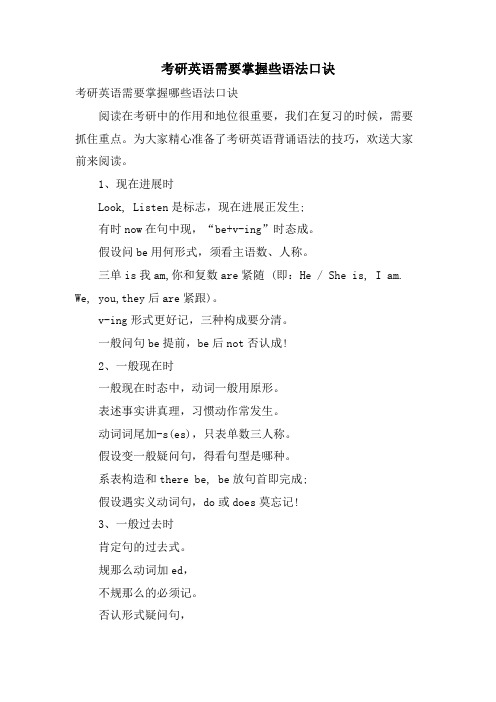
考研英语需要掌握些语法口诀考研英语需要掌握哪些语法口诀阅读在考研中的作用和地位很重要,我们在复习的时候,需要抓住重点。
为大家精心准备了考研英语背诵语法的技巧,欢送大家前来阅读。
1、现在进展时Look, Listen是标志,现在进展正发生;有时now在句中现,“be+v-ing”时态成。
假设问be用何形式,须看主语数、人称。
三单is我am,你和复数are紧随 (即:He / She is, I am. We, you,they后are紧跟)。
v-ing形式更好记,三种构成要分清。
一般问句be提前,be后not否认成!2、一般现在时一般现在时态中,动词一般用原形。
表述事实讲真理,习惯动作常发生。
动词词尾加-s(es),只表单数三人称。
假设变一般疑问句,得看句型是哪种。
系表构造和there be, be放句首即完成;假设遇实义动词句,do或does莫忘记!3、一般过去时肯定句的过去式。
规那么动词加ed,不规那么的必须记。
否认形式疑问句,没有be加did。
如把did加在前,动词还要归原形。
4、基数词变序数词基变序,很容易,一二三,特殊记,th从四起。
八去t来九去e,遇到ve,f替,ty变为tie,后加th莫迟疑,假设想表示几十几,只变个位就可以。
5、时间介词巧记歌年、月、季节前用in, (如:in xx, in September, in spring)日期前面行不通。
遇到几号或星期改用on来做代替, (如:on January 1,onWedesday)上午、下午、晚上仍用in。
(如:in themorning/afternoon/evening)假设是某日上下午,也是用on才能行。
(如:on theevening of the Mid-autumn Day)正午、夜里用at, (如:at noon, at night)时、分用法也同理。
(如:, at two, at two)如假设“差”点须加to, (如:two to two)如假设“过”点改past。
考研英语必背120个动词总结

考研英语必背120个动词总结Embarking on the journey of postgraduate entrance exams, mastering a set of essential verbs is crucial for acing the English section. Here are some that are indispensable:1. Acquire: To gain knowledge or skills through experience or education, as in "acquire proficiency in English."2. Adapt: To adjust or become accustomed to new conditions or environments, which is vital for students adapting to the rigorous study schedule.3. Analyze: To examine something in detail, a skill necessary for dissecting complex English texts.4. Assess: To evaluate or estimate the significance, situation, or condition of something, an ability that comes in handy during English exams.5. Cite: To quote or refer to something as an authority or proof, a common practice in academic writing.6. Conclude: To bring something to an end, especially a discussion or argument, which is the final step in essay writing.7. Demonstrate: To show the existence or truth ofsomething by giving proof or evidence, a key element in argumentative essays.8. Differ: To be unlike or distinct, an important concept when comparing and contrasting ideas.9. Emphasize: To give special importance or prominence to something, a technique used to highlight key points in writing.10. Evaluate: To judge or determine the significance, worth, or quality of something, essential for critical analysis in English exams.11. Illustrate: To clarify or make something clear by giving examples, a method to support arguments with concrete evidence.12. Incorporate: To include something as a part of a whole, a strategy used to integrate new ideas into existing knowledge.13. Interpret: To explain the meaning of something, askill that is fundamental for understanding and analyzing texts.14. Justify: To show or prove to be right or reasonable,a common requirement in essay writing.15. Modify: To make partial changes in something, a process that can be applied to one's own writing forimprovement.16. Predict: To say that something will happen in the future, a skill useful in understanding the implications of a text.17. Summarize: To give a brief statement of the mainpoints of something, a skill needed for condensing lengthy texts.18. Synthesize: To combine different ideas or elements to form a new whole, an advanced skill for integrating knowledge from various sources.19. Utilize: To use something effectively and efficiently,a strategy for applying learned vocabulary in context.20. Validate: To confirm the truth or authenticity of something, a process that can be applied to verify one's own understanding of the material.By internalizing these verbs and their usage, you'll be better equipped to tackle the English section of the postgraduate entrance exams with confidence.。
考研英语基础语法汇总

考研英语基础语法汇总一、非谓语动词( V+ing, V+ed)1, 动名词(1)作主语和宾语Saying is easier than doing.说比做容易。
(2)作介词宾语We get pleasure from loving and being loved.我们从爱别人和被别人爱中得到快乐。
2,分词作定语(1)前置The beginning student should be given more encouragement.初学者应多给予鼓励。
A balanced diet provides nutrition for your body.均衡的食物使你的身体获得营养。
(2)后置Those living on a mountain live off the mountain.靠山吃山Children disciplined when they are young will become good citizen.小时候受过良好教育的儿童长大会成为好公民。
3,分词作状语Hearing the news, they immediately set off for Shanghai.听到这个消息,他们立即出发到上海去了。
Seen from the pagoda, the south foot of the Purple Mountain is a sea of trees.从这个塔上远眺,紫金山南麓是树的海洋。
Printed white, the house looks bigger.漆成白色后,这房子像是更大了。
Having written an important letter, I litsened to the music for a while.写完一封重要的信之后,我听了一会儿音乐。
Arguing from the view that humans are different from animals in every relevant respect, extremists of this kind think that animals lie outside the area of moral choice.持极端观点的人认为,人与动物在各相关方面都不相同,所以对待动物无须考虑道德问题。
2023年考研英语总结归纳-个人用心整理
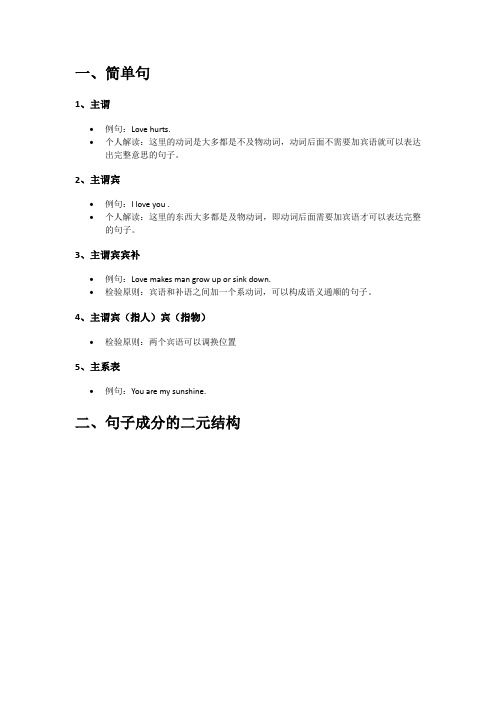
一、简单句1、主谓•例句:Love hurts.•个人解读:这里的动词是大多都是不及物动词,动词后面不需要加宾语就可以表达出完整意思的句子。
2、主谓宾•例句:I love you .•个人解读:这里的东西大多都是及物动词,即动词后面需要加宾语才可以表达完整的句子。
3、主谓宾宾补•例句:Love makes man grow up or sink down.•检验原则:宾语和补语之间加一个系动词,可以构成语义通顺的句子。
4、主谓宾(指人)宾(指物)•检验原则:两个宾语可以调换位置5、主系表•例句:You are my sunshine.二、句子成分的二元结构三、并列句定义:由并列连词(如and,so , but, or)把两个或两个以上的简单句连在一起而构成的句子。
1.表转折的并列连词:but, yet, while , however , still , on the contrary2.表示选择的并列连词:主要为or,其他为:either……or,neither……or,otherwise3、表平行关系的并列连词:not only……but also,on the one h and ……on the other hand4、表因果关系的并列连词:for,therefore,so,thus注:(1)so不能与because连用。
(2)but,while,不能与although连用,但是yet,still可与although连用。
四、如何从主从复合句中找到主句?第一步:找到所有的引导词第二步:引导词之后的第一个动词为从句谓语动词第三步:所有从句谓语动词找到之后,最后剩下的即为主句的谓语动词。
•引导词省略的情况:1.宾语从句的引导词that常省略。
2.宾语从句的先行词如果在从句中做宾语时,引导词常省略。
五、各大从句1.主语从句:(连接词+简单句)+谓语+宾语例句:what is worth doing is worthing doing well.主语从句的变体:•It is +形容词+that从句•It is +名词短语+that从句•It is +过去分词+that从句•It +不及物动词或短语+that从句2、宾语从句:主语+谓语+(连接词+简单句)例句:We believe that he is honest.3、表语从句:主语+系动词+(连接词+简单句)例句:The problem was that who could go there.4、同位语从句:名词+连接词+简单句例句:They were worried over the fact that you were sick.•同位语从句与定语从句的区别:(1)同位语从句是名词后的完整句子,定语从句是名词后的不完整的句子。
考研英语基础复习的语法知识
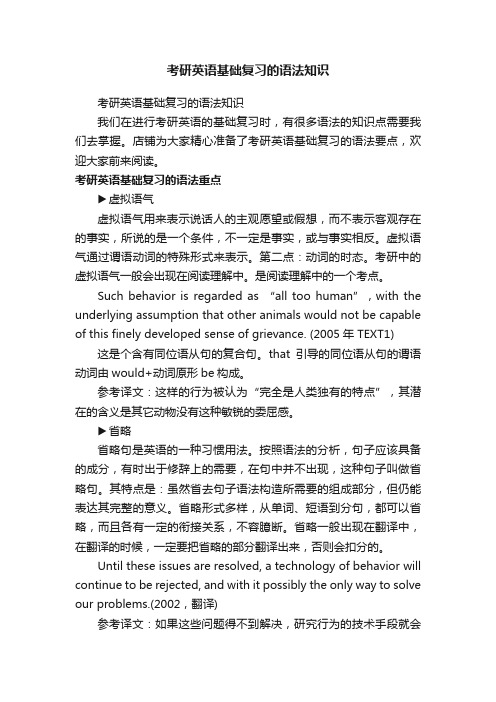
考研英语基础复习的语法知识考研英语基础复习的语法知识我们在进行考研英语的基础复习时,有很多语法的知识点需要我们去掌握。
店铺为大家精心准备了考研英语基础复习的语法要点,欢迎大家前来阅读。
考研英语基础复习的语法重点▶虚拟语气虚拟语气用来表示说话人的主观愿望或假想,而不表示客观存在的事实,所说的是一个条件,不一定是事实,或与事实相反。
虚拟语气通过谓语动词的特殊形式来表示。
第二点:动词的时态。
考研中的虚拟语气一般会出现在阅读理解中。
是阅读理解中的一个考点。
Such behavior is regarded as “all too human”,with the underlying assumption that other animals would not be capable of this finely developed sense of grievance. (2005年 TEXT1) 这是个含有同位语从句的复合句。
that引导的同位语从句的谓语动词由would+动词原形be构成。
参考译文:这样的行为被认为“完全是人类独有的特点”,其潜在的含义是其它动物没有这种敏锐的委屈感。
▶省略省略句是英语的一种习惯用法。
按照语法的分析,句子应该具备的成分,有时出于修辞上的需要,在句中并不出现,这种句子叫做省略句。
其特点是:虽然省去句子语法构造所需要的组成部分,但仍能表达其完整的意义。
省略形式多样,从单词、短语到分句,都可以省略,而且各有一定的衔接关系,不容臆断。
省略一般出现在翻译中,在翻译的时候,一定要把省略的部分翻译出来,否则会扣分的。
Until these issues are resolved, a technology of behavior will continue to be rejected, and with it possibly the only way to solve our problems.(2002,翻译)参考译文:如果这些问题得不到解决,研究行为的技术手段就会继续受到排斥,解决问题的唯一方式不能也随之继续受到排斥。
考研英语语法(从句)详细解析总结(含例句)

考研英语语法(从句)详细解析总结(含例句)(一)英语从句的原理1.我们已经学习过句子的成分【参考句子成分讲义】当一个完整的句子A成为另一个句子B的某一成分时,A就变成了从句●eg. I know that you are hard-working!我知道你们很努力●完整的句子A { you are hard-working } 就叫做从句,在主句 B [I know A]中作宾语➡️A随从/服从B2.英语的三种句子●简单句:不能再拆分的句子【参考简单句讲义】●复杂句:也叫做并列句,两个句子不分主次,仅仅逻辑关系词连接and、but、however,,,●eg. I like apples,and he likes bananas. = He likes bananas,and I like apples.●复合句:主从复合句,主句 + 从句,两个句子有主次关系(二)英语从句的分类所以有哪些句子成分就会有哪些从句类型:除了英语的核心动词之外,其他所有句子成分都可以有从句1.①形容词从句 = 定语从句 = 关系从句➡️英语从句中最重要的;内容最多的;最难的一类从句●概念●对某个人或者事物进行描述,具有形容词性质➡️形容词性从句●在句子中充当定语这个成分,起修饰作用➡️定语从句●构成往往需要关系词来引导➡️关系从句●形容词从句的思维方式●中文思维:形容词都放在被修饰词之前,即形容词/句子 + 的eg. 好吃的苹果;努力学习的他们●英语思维●单个词修饰时,也放在被修饰词之前eg. a tasty apple●用一句话来修饰时,就需要在被修饰词后面 + 一个与它有关系的词 + 另一个句子,即先行词 + 关系词 + 定语从句●思维对比:这也是我们在翻译时不能逐字逐句顺序进行的原因,定语从句就需要逆序先翻译●中文:兔子在吃一根我买来的胡萝卜【前置】●英语:兔子在吃一根胡萝卜(胡萝卜的关系词)我买的【后置】The rabbit is eating a carrot that I bought.●形容词从句的构成:关系词(引导定语从句)●关系代词:引导词起指代、替代的作用●方法:陈述句语序中,被修饰词更换为关系代词➡️把关系代词放到开头,就变成了从句●that(那):The rabbit is eating a carrot that I bought.I bought that →that I bought●who(主语):The student who is reading is my friend.who is reading →who is reading●whom(宾语):The student whom I taught is my friend.I taught whom →whom I taught●whose(ta的):The student whose bag is pink is my friend.whose bag is pink →whose bag is pink●which(那个):The student which is reading/I taught is my friend.which is reading/I taught which →which is reading/I taught●that & which:指代人或物(主语宾语都可以),经常可以互换●先行词唯一:that●eg. The rabbit ate the biggest carrot that I 've ever seen. 兔子吃了我见过最大的胡萝卜●the biggest已经限定了先行词是唯一的,所以只能用that●先行词多选一:which●eg. The rabbit is eating a carrot that/which I bought.●我买了很多根胡萝卜,兔子吃的只是其中随便一根●关系副词:引导词的词性是副词关系副词 = 介词 + 关系代词●where(地点):This is the place where I study.●why(原因):This is the reasin why I study.●when(时间):That was the day when I met him.●形容词从句的限定性和非限定性●通过前面的学习,大家已经明白了定语从句的主要功能就是修饰限定范围,所以限定性和非限定性的区别即:是否限定了先行词的范围/性质●限定性定语从句●上述例句均为限定性定语从句:全部都限制了先行词的范围●非限定性定语从句:通常有逗号隔开,作插入语补充信息●eg. I read the book,which is on the desk. 我读了本书,那本书在桌子上(有种接着说,补充说明的意思)●eg. My head,which is big,is useful when it rains. 我有大头下雨不愁(作插入语补充信息,即使删去也不影响原句子完整)●eg. Rabbits eat carrots, which is not surprising. 兔子吃胡萝卜,这事不稀奇(甚至可以指代一个完整的句子进行修饰)2.②名词从句●引导词:相当于一个信号告诉你“那么接下来从句要开始咯!”注意:引导词在从句开头;从句是陈述句语序●that:确定信息●whether;where;when;how;who;what:不确定信息●主语从句:将句子中的主语变成从句的形式●正常语序:主语放在句子最开头●eg. That rabbits eat carrots is obvious.●eg. Whether rabbits eat carrots is obvious. 是否吃●eg. Where rabbits eat carrots is obvious. 在哪吃●eg. When rabbits eat carrots is obvious. 什么时候吃●eg. Who eats carrots is obvious. 谁吃●eg. What rabbits eat is obvious. 吃什么●eg. How rabbits eat carrots is obvious. 怎么吃●形式主语:it指代主语从句,it本身没有什么意义【翻译时,可以拆成两句或是倒序先翻译主语从句】英语句子的主语从句过长就会头重脚轻,所以会改个形式说出来●eg. It is obvious that rabbits eat carrots. 很明显,兔子吃胡萝卜/兔子吃胡萝卜这事儿很明显●eg. It is obvious whether rabbits eat carrots.●可自行练习改写上述例句●表语从句:将句子的表语变成从句的形式●eg. The reason is that you need to study.●eg. It feels that you like me.●同位语从句:将句子的同位语变成从句的形式●一般修饰抽象名词:the fact;the idea...●eg. The question that/whether rabbits eat carrots is interesting.●宾语从句:从句作句子的宾语●确定信息&不确定信息●eg. I know that rabbits eat carrots.●eg. I know whether/where/... rabbits eat carrots.●宾语从句引导词that往往可以省略,注意判断●eg. I know rabbits eat carrots.●宾语从句的否定●在谓语动词前否定,而非在从句中,否则会有句意的改变●eg. I don't know rabbits eat carrots.●eg. I don't think rabbits eat carrots.●eg. I don't believe rabbits eat carrots.●主从时态一致,但从句描述客观规律例外●eg. I knew you gratuated last year.●eg. I knew the sun rises in the east.●宾补从句:从句作句子的宾语补足语●使用较少●eg. You can call me whatever you like. 你随便怎么称呼我都可以●eg. My parents made me who I am.3.③副词从句 = 状语从句英语从句中种类最多的➡️因为补充说明的可能性最多●概念●在句中起到副词的作用,一般补充说明动词、形容词、副词等➡️副词从句●句子成分上说,充当了句子的状语➡️状语从句●时间状语从句●在某一时间点之前:before●eg. I cleaned the room before you came.●= Before you came, I cleaned the room.●在某一时间点之中●when:强调在某个时间点●eg. I was watching TV when my mom came home. 当我妈妈回家时,我正在看电视●= When my mom came home,I was watching TV.●while:强调在一个时间段内●eg. I was watching TV while my mom was cooking. 我妈妈做饭时,我在看电视●= While my mom was cooking,I was watching TV.●as:强调同时进行的两个动作●eg. My mom cooked as she watched TV. 我妈妈一边做饭一边看电视●= As my mom watched TV,she cooked.●在某一时间点之后:after●eg. I go to school after I get up.●= After I get up,I go to school.●从之前某一时间点开始算起的一个时间段,往往暗示了对之后有影响(完成时态)since●eg. I have read two books since my mom came home. 自从我妈妈回家以后,我已经看了两本书了●直到之后的某一时间点:until●eg. I waited until my mom came home. 我一直在等,直到妈妈回家●not,,,until,,,:直到,,,才,,,(注意翻译方法)●eg. I didn't go to sleep until my mom came home. 直到我妈妈回家我才睡觉●一个动作紧跟着另一个动作发生:as soon as(注意翻译顺序:一,,,就,,,)●eg. It rained as soon as we went to schoo. 我们一去上学,就下雨了●下次,,,:the next time●eg. I will hug you the next time we meet. 下次我们见面时我一定会拥抱你●地点状语从句●引导词:where●eg. I read books where I study.●强调形式:wherever不管哪里;everywhere所有地方;anywhere任何地方●eg. I read books wherever/everywhere/anywhere I can sudy.●条件状语从句从句比主句落后一个时态●真实条件句:真实的假设 if●eg. If the rabbit sees a carrot,it will eat it.●虚假的假设:if【参考虚拟语气讲义】●否定条件句:unless 除非,,,否则/不然●eg. Unless it rains,the game will be played. 除非下雨,比赛将正常进行●= If it doesn't rain,the game will be played.●其他引导词:as long as只要;in case如果●eg. You may borrow my book as long as you keep it clean. 只要你保持书的清洁,你就可以把我的书借去。
考研英语语法大全(适合打印)
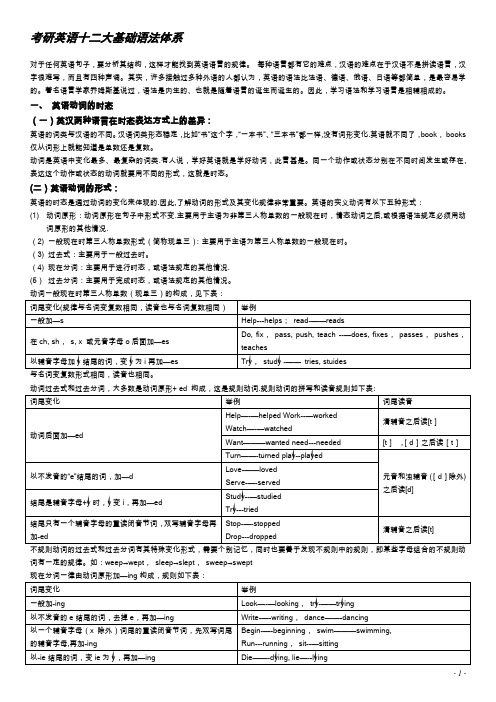
考研英语十二大基础语法体系对于任何英语句子,要分析其结构,这样才能找到英语语言的规律。
每种语言都有它的难点,汉语的难点在于汉语不是拼读语言,汉字很难写,而且有四种声调。
其实,许多接触过多种外语的人都认为,英语的语法比法语、德语、俄语、日语等都简单,是最容易学的。
著名语言学家乔姆斯基说过,语法是内生的、也就是随着语言的诞生而诞生的。
因此,学习语法和学习语言是相辅相成的。
一、英语动词的时态(一)英汉两种语言在时态表达方式上的差异:英语的词类与汉语的不同。
汉语词类形态稳定,比如“书”这个字,“一本书”、“三本书”都一样,没有词形变化.英语就不同了,book,books 仅从词形上就能知道是单数还是复数。
动词是英语中变化最多、最复杂的词类.有人说,学好英语就是学好动词,此言甚是。
同一个动作或状态分别在不同时间发生或存在,表达这个动作或状态的动词就要用不同的形式,这就是时态。
(二)英语动词的形式:英语的时态是通过动词的变化来体现的.因此,了解动词的形式及其变化规律非常重要。
英语的实义动词有以下五种形式:(1)动词原形:动词原形在句子中形式不变.主要用于主语为非第三人称单数的一般现在时,情态动词之后,或根据语法规定必须用动词原形的其他情况.(2) 一般现在时第三人称单数形式(简称现单三):主要用于主语为第三人称单数的一般现在时。
(3) 过去式:主要用于一般过去时。
(4) 现在分词:主要用于进行时态,或语法规定的其他情况.(5)过去分词:主要用于完成时态,或语法规定的其他情况。
与名词变复数形式相同,读音也相同。
动词过去式和过去分词,大多数是动词原形+ ed 构成,这是规则动词.规则动词的拼写和读音规则如下表:不规则动词的过去式和过去分词有其特殊变化形式,需要个别记忆,同时也要善于发现不规则中的规则,即某些字母组合的不规则动词有一定的规律。
如:weep→wept,sleep→slept,sweep→swept为了学习的方便,人们把时间分为四个阶段:“现在、过去、将来、过去将来”。
考研英语语法必考的知识点有哪些
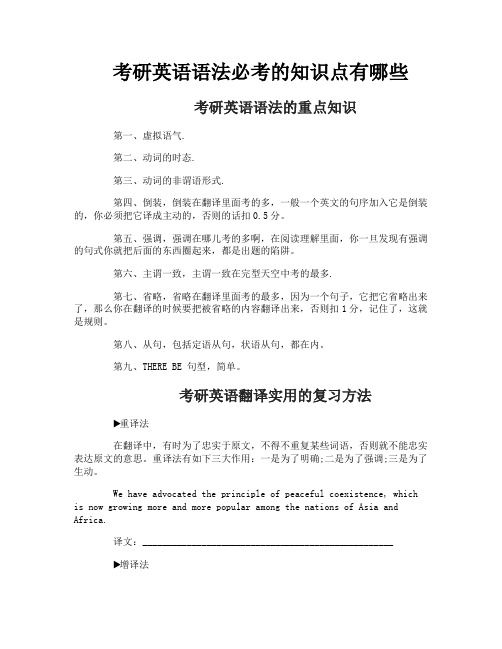
考研英语语法必考的知识点有哪些考研英语语法的重点知识第一、虚拟语气.第二、动词的时态.第三、动词的非谓语形式.第四、倒装,倒装在翻译里面考的多,一般一个英文的句序加入它是倒装的,你必须把它译成主动的,否则的话扣0.5分。
第五、强调,强调在哪儿考的多啊,在阅读理解里面,你一旦发现有强调的句式你就把后面的东西圈起来,都是出题的陷阱。
第六、主谓一致,主谓一致在完型天空中考的最多.第七、省略,省略在翻译里面考的最多,因为一个句子,它把它省略出来了,那么你在翻译的时候要把被省略的内容翻译出来,否则扣1分,记住了,这就是规则。
第八、从句,包括定语从句,状语从句,都在内。
第九、THERE BE 句型,简单。
考研英语翻译实用的复习方法▶重译法在翻译中,有时为了忠实于原文,不得不重复某些词语,否则就不能忠实表达原文的意思。
重译法有如下三大作用:一是为了明确;二是为了强调;三是为了生动。
We have advocated the principle of peaceful coexistence, which is now growing more and more popular among the nations of Asia and Africa.译文:___________________________________________________▶增译法为了使译文忠实地表达原文的意思与风格并使译文合乎表达习惯,必须增加一些词语。
A new kind aircraft-small, cheap, pilotless -is attracting increasing attention.译文:___________________________________________________▶减译法和其他一切事物一样,翻译也是有增必有减。
理解了增译法之后也就明白了减译法,它是增译法的反面。
These developing countries cover vast territories, encompass a large population and abound in natural resources.译文:___________________________________________________▶词类转译法在翻译时,由于两种语言在语法和习惯表达上的差异,在保证原文意思不变的情况下,译文必须改变词类,这就是词类转译法,这种方法不仅指词类的改变,而且还包括词类作用的改变和一定词序的变化。
考研英语核心语法(思维导图)

考研英语核心语法句子的成分谓语有时态的实义动词或者系动词充当谓语当一句话需要动词而没有动词时,永远用be,且be无意义谓语只能是动词,动词只能做谓语,一句话中姑且只有一个谓语动词分类实义动词及物动词不及物动词+介词系动词be感官动词:look、sound、smell、taste、feel 变化:become、get、turn、grow、fall 保持:keep、stay、remain、stand 表象:seem、appear 证明:prove情态动词说话人的主观态度能够 can/could许可,可能性 may/might 必须,不得不 must/have to 应该 should/ought to 将会 would 想要 need 敢 dare对现在和将来的推测一定做过 must have done本没必要做但做了 need not have done 本能做但没做 could have done 本应该做 should have done助动词一句话中不做谓语的动词要变成非谓语的形式主动-ing被动-ed 目的- to do一句话中只有且仅有一个有时态的实义动词或者是系动词充当谓语主语名词、代词、从句、非谓语动词均可以充当主语成分主语不能少,当一句话没有主语的时候+it做形式主语there be/seem/exist/remain句型---"有"分清主被动关系以下情况没有被动动词后有介词无被动系动词无被动have“有”无被动宾语名词、代词、从句、非谓语动词均可以充当宾语成分表语名词、代词、从句、非谓语动词、介词短语、形容词均可以充当表语成分简单句主谓结构主谓宾结构主语一定是动作的发出者宾语一定是动作的承受者宾语“动作”【及物动词】&【不及物动词+介词】主系表结构主谓双宾结构并列句上下句存在逻辑关系平行转折递进选择因果并列句通常会出现省略省略出现于连词之后,连词之后的成分连词前一般都有连词前有的内容,连词后没有的内容,就是省略内容代词指代:就近指代【语法&意思一致】找到省略,补全省略内容定语从句定语”....的“+名词 修饰A ofB ofC : C的B的A有意识的加定语修饰可以拉长句子引导词如果先行词和引导词之间有了介词人:who ➡介词+whom 物:that ➡介词+which限制性定语从句&非限制性定语从句注意as,which都可以引导非限制性定语从句,但是which引导的只能放在句子后面名词性从句名词在句中充当的成分【主宾表同】被句子替代引导词that:从句为陈述句,that无意义,不充当成分wether:从句一般为疑问句,wether“是否”,不充当成分,可以引导所有名词性从句中的是否特殊疑问词主语从句众所周知......看到it....that或者引导词位于句首且不被符号分开宾语从句实义动词+引导词that在宾从中可以省略if"是否"时,只用于宾从表语从句系动词+引导词同位语从句“包子陷” 解释状语从句状语状语在一句话中位置随意,除了无法修饰名词之外,均可以修饰根据引导词本身的意思进行状从分类时间状语从句地点状语从句原因状语从句目的状语从句结果状语从句让步状语从句方式状语从句条件状语从句比较状语从句注意时态:所有的状从中,若主句的动作和从句的动作尚未发生:“主将从现”若发生,根据需要选择状语以及状语从句一般翻译在离它最近的那句话前特殊句型强调句 it...that仅是框架不影响句子,去掉强调看清结构后翻译倒装句虚拟语气插入语。
考研英语语法(动词)详细解析总结(含例句)

考研英语语法(动词)详细解析总结(含例句)●一. 动词的分类后续语法内容的基础,同学们只需要了解清楚这些概念、能够明白区分,在后续长难句分析时对这些说法不陌生即可,不然遇到完形填空和翻译会一头雾水哦1.可作谓语动词:句子的核心句子成分中的谓语●实义动词:也叫做行为动词,因为这些动词都拥有实际的意义在考研英语中大部分的遇到的其实只需要区分及物和不及物动词,通常会在完形填空的选项和翻译中进行考察,但还是希望同学们能够认真学习理解,为自己的英语长难句打下坚实的基础●按照是否需要动作的承受者划分●及物动词:需要带个人或者物品在动词后面,就是说动作是有对象的,即宾语eg. read a book 读一本书●不及物动词:可以独立完成的动作,即动作没有对象eg. A cat sleeps. 一只猫睡觉●按照状态动作划分●动作动词:可以动起来的动作eg. eat 吃●状态动词:相对静止,表示一种状态eg. have 有;feel 感觉;own 拥有●系动词:也叫做连系动词,连系主语和表语●非常好理解,就是“赋值”的意思,把系动词后面的含义赋予给它之前的部分●am;is;are●eg. I am a girl. 我是一个女孩 (am的作用就是把女孩这个信息赋予给我)●keep;stay;seem;appear;feel;become;turn...●eg. The sky grew dark. 天空渐渐变暗(就是把暗这个信息赋值给天空)2.可辅助构成谓语动词:助动词不能独立做句子的谓语●概念●句子中的谓语动词本身有时候无法独立表达某些语法概念,需要其他词的辅助来表达;而这类辅助词自己本身不能做谓语动词●eg. The student will read a book. 这个学生将看书【如果我们想要表达将来时态,但动词本身并不能表达将来的意思,所以久必须在前面加上will来“辅助”完成表达;will就是构成将来时的助动词,并且will本身不能做谓语动词】●特征(判断)●(是否)辅助主动词构成语法概念●(是否)不能单独作谓语动词●分类●基本助动词:be;do;have作为助动词时,他们本身没有什么任何实际含义,但是要注意他们也可以作实义动词:be 存在;do做;have有●eg. The student is reading a book. 学生正在看书(辅助构成现在进行时)●eg. The student has read a book. 学生已经看过书了(辅助构成现在完成时)●eg. I do like you!我真的喜欢你(辅助构成强调句)●情态(助)动词注意:前三组后面的词是前面的过去式●can/couldcould在虚拟语气中更多使用●表能力(做…);会…;可以…●eg. I can read a book. 我可以看书(有能力)●eg. Can/Could I borrow your money?我可以找你借钱吗?(表请求或许可)●eg. Anything can happen. 什么事都可能发生(可能性)●may/might●表达请求,同上●或许;也许,表可能性,可能性程度小于can/could●表祝愿 eg. May you succeed!祝你成功!●shall/should●shall●构成将来时,同will●表推测、征求意见 eg. Shall we meet tomorrow?我们明天见怎么样?●表警告、命令 eg. You shall not pass!你不能通过!●should●表应当 eg. You should study now!你现在应该去学习!●表有一定根据的推测 eg. It should rain tomorrow. 明天应该会下雨(有天气预报一定的根据性)●构成虚拟语气(后续学习)●will/would●构成将来时(后续时态学习)●表请求、建议 eg. Will you lend my money?你愿意借我钱吗?●表推测、假设 eg. Ask him,he will/would know. 问他吧,他可能知道●must●表必须 eg. You must finish your homework!你必须做完作业!●表禁止 eg. You must not(mustn't)smoke here. 这里禁止吸烟注意:must not不是“不必须”的意思,而且“必须不”!●表肯定 eg. You must be hungry.(干饭时间到了)你肯定饿了吧●ought to 同should:应该●dare/dared 敢 eg. How dare you!你好大的胆子!●need●实义动词:需要 eg. I need you!我需要你!●情态动词:需要;有必要 eg. You don't need to study. 你不需要学习【相当于must表不需要的否定】●used to●表过去经常的事情,强调与现在的对比●eg. I used to eat apples,now I only eat bananas. 我过去经常吃苹果,但我现在只吃香蕉●半助动词:既像主动词又像助动词●be able to 表能力同can/could●表将要做,同will●be going to●be about to●had better3.不可作谓语动词:非谓语动词(非限定性动词)一个简单句中只能有一个谓语动词,所以其他动词只能以非谓语动词的形式出现●概念●不受主语限制、不被限定的动词,不具有表达时间和人称的作用(与谓语动词相反)●eg. I like to study. 我喜欢学习(like就是句子的谓语动词,受主语限制:helikes;而to study则不受主语限制)●不定式:to do(to + 动词原形)●充当句子主语 To eat an apple everyday is good for health. 一天吃一个苹果对健康有好处(to eat 不定式不受具体的人和时间限制)= It is good for health toeat an apple everyday. (虽然it做了形式主语,单核心还是to eat 不定式)●作后置定语 I have many books to read. 我有很多书要看(to read做后置定语来修饰books:我有很多书,什么样子的书呢?需要阅读的书)●作状语●表原因 I am surpised to get a thumbs-up. 我很惊讶(因为)得到一个赞= I am surpised because I get a thumbs-up.●表目的 I study to pass exams. 我复习为了考试顺利= I study in order that I can pass exams.●高级不定式:与后续时态结合●动名词:doing(动词原形+ing)●从名字也可以知道,就是把动词转化为名词性质使用,本质相当于名词●eg. Seeing is believing. 眼见为实(seeing作主语;believing作表语)●现在分词:doing(动词原形+ing)●本质相当于形容词,起修饰作用【表主动关系:描述做动作的人/物】●eg. The book is interesting. 这本书很有趣(书主动令人感到很有趣)●过去分词:done(一般动词原形 + ed,不规则动词需要积累记忆)●本质相当于形容词,起修饰作用【表被动关系:描述动作的接收者】●eg. I am interested in the book. 我对这本书感兴趣(我被这本书引起了兴趣)●二. 动词的时态动作的时间+动作的状态1.前言●英语的十六大时态●4种时间与4种状态排列组合就是英语语法的16种时态,但是时态体系过于庞大复杂,许多时态也非常少见,我们只需要学习常见的时态即可●时间:现在;过去;将来;过去将来【对于过去某一个时间点的将来,eg.昨天是前天的将来】●状态:一般;进行;完成;完成进行【动作完成了一部分,仍在进行】●为什么大家之前学习英语时态觉得是一团乱麻呢●难点1:时间&状态搅在一起在学校学习时态时,总是遇到一个时态学习一种时态,通常就是一会学过去完成时一会又是学一般现在时,没有清晰地认知时间和状态组合的方式,脑子里的时态杂糅在一起,让大家觉得时态很复杂很难●难点2:动词的变位在中文表达里,对于一个动作的完成和进行描述地非常简洁,例如:我正在吃饭;我吃饭了但是在英语里,则需要大家记动词的不同形式,eg.eat~ate~eaten 原型~过去式~过去分词●难点3:助动词英语时态的表达通常还需要助动词进行辅助,并且助动词会随着时态有不同的变形,例如助动词have,在现在完成时使用是have(has),而在过去完成时里使用是had2.1一般现在时●概念理解●动作发生在“现在”的时间段内经常发生的动作或者存在的状态●1. 表达事实没有状态限制,也没有时间限制●陈述一些事实、具有真理性的内容●eg. The sun rises in the east. 太阳从东边升起●eg. You love to learn. 你热爱学习●2. 表达习惯性、规律性、重复的动作●eg. I read books. 我阅读(我的习惯)(每天都发生的事情)●eg. You get up at 7 o'clock everyday. 你每天七点钟起床●3. 表达预计发生的事(客观的事实)●eg. The bus leaves at 6 PM tonight. 公交车今晚六点离站●形式用法●第一人称/第二人称/名词复数 + 动词原形●eg. We usually go to school at 7:30. 我们通常七点半去上学●eg. My parents work five days a week. 我的父母一周工作五天●第三人称单数(单三)+ 动词原型 + s注意:有些动词的单三形式有特殊变形,+s是普遍情况●eg. He likes to swim. 他喜欢游泳●eg. She goes shopping every weekend. 她每周末都去逛街3.2现在进行时●概念理解●动作发生在“现在”动作正在进行中,相当于中文中的“正在做某事”●形式用法●助动词be的变位(am/is/are)+ 动词的现在分词(动词原形 + ing)注意:有些动词的特殊变位需要大家积累记忆;例如:write去e+ing、get双写t+ing●eg. You are reading a book. 你正在看书●eg. I am writing papers. 我正在写论文●eg. She/He is doing homework. 她/他正在做作业4.3现在完成时●概念理解●1. 表示强调动作的影响或是结果●动作发生在“过去”并且已经完成这个动作对现在仍存在影响,强调对现在的影响●eg. I have lost my pen. 我的钢笔丢了(结果:我现在没有钢笔用)●eg. He has finished his work. 他的工作已经完成了(结果:他可以去休息了)●2. 表示动作的持续●动作从“过去”开始发生但还没有结束一直持续到现在,也可能还会持续下去●eg. You have been in school for 22 years. 你已经上学22年了(你从过去开始上学,持续到现在,已经持续22年了,你还可能继续持续下去)●eg. He has been busy since last week. 他从上周开始就一直很忙(持续到现在也很忙)●形式用法●助动词have的变位(have/has) + 动词的过去分词(通常动词原形 + ed)注意:有些动词的特殊变位需要大家积累记忆;例如:do~did~done●eg. I have been Wuhan before. 我之前去过武汉●eg. She hasn't finished her work yet. 她还没有完成工作5.4现在完成进行时●概念理解●动作从“过去”开始发生一直持续到现在,并且还会持续下去●可以理解为现在完成时和现在进行时的合体,强调动作的持续性●形式用法●助动词have的变位(have/has)+ been + 动词的现在分词●eg. The rabbit has been eating carrots. 兔子一直在吃胡萝卜(兔子已经吃了一段时间,还将继续吃下去)●eg. I have been watchinig this movie. 我在看这一部电影(我到现在为止已经看了一段时间了,我还要继续再看一段时间)6.5一般过去时●概念理解●就是一般现在时往前推了一个时间,动作发生在“过去”的时间动作发生了●形式用法●各人称 + 动词过去式(通常是动词原形 + ed)注意:不要与过去分词混淆,特殊动词需要记忆,例如:go~went;take~took●eg. I/We/You/He/She/It/They/The rabbit ate a carrot. 我/我们/你(们)/他/她/它/他们/这只兔子吃了一根胡萝卜7.6过去进行时●概念理解●动作发生在“过去”的某个时间段动作是当时进行中的●形式用法●助动词be的变位(was/were)+ 动词的现在分词(动词原形 + ing)●eg. I/He/She/It/The rabbit was eating a rabbit. 我/他/她/它//这只兔子吃了一根胡萝卜(在过去的某个时间点正在吃胡萝卜的过程)●eg. You/We/They were reading books. 你(们)/我们/他们处于过去的某个时间点正在看书的过程8.7️过去完成时●概念理解●就是现在完成时态往前推一个时间段,动作发生在“过去”并结束相对于过去的某一个时间造成了影响●形式用法●助动词have的变位(had) + 动词的过去分词(通常动词原形 + ed)●eg. I had eaten 5 carrots for lunch yesterday,so I wasn't hungry last night. 我昨天午饭吃了五根胡萝卜,所以我昨晚不饿(昨天中午发生的动作对昨天晚上造成了影响:我不饿)●eg. He tried to find me yesterday afternoon,but I had already gone to Wuhan. 他昨天本来想找我,但是我已经去武汉了(我可能昨天早上、前天——比昨天下午早的时间去武汉了,对昨天下午造成了影响:他没有找到我)9.8️一般将来时●概念理解●表示动作发生在“将来”的某一时间点动作将会发生(说话者十分肯定)●形式用法●各人称 + will + 动词原形这是最常见的将来时表达方式●eg. I/We/You/He/She/It/They/The rabbit will eat a carrot. 我/我们/你(们)/他/她/它/他们/这只兔子将要吃一根胡萝卜10.9️将来进行时●概念理解●就是现在进行时往后推了一个时间段,动作发生在“将来”的某个时间段动作是在当时进行的过程中●形式用法●will + 助动词be + 动词的现在分词(动词原形 + ing)●eg. I/We/You/He/She/It/They/The rabbit will be eating a carrot for dinnertomorrow. 我/我们/你(们)/他/她/它/他们/这只兔子明天晚餐将会在吃一根胡萝卜(明天晚餐这个时间会处于吃胡萝卜这个动作的过程中)11.将来完成时●概念理解●就是现在完成时态往后推一个时间段,动作发生在“将来”并结束相对于未来的某一个时间造成了影响●形式用法●will + 助动词have + 动词的过去分词(通常动词原形 + ed)●eg. I will have finished doing my homework by 4 PM tomorrow,so I can goshopping after that. 我将在明天下午四点前写完作业,那样我之后就可以去逛街了(对于明天下午四点钟这个时间点完成作业将会对明天晚上造成影响:我可以出去逛街)●三. 动词的语气1.陈述语气:描述事实(句号结尾)●前面时态中的所有例句均是陈述语气2.祈使语气:命令/请求(通常会以感叹号结尾)●一般会使用第二人称“你” + 一般现在时●去掉“你”,保持动词原形●eg. Go to school!(you go to school!)●eg. Never give up!(you never give up!)●eg. Don‘t do th at!(you don’t do that!)3.虚拟语气:与现实相反的●其实虚拟语气在中文中也常常有表达,只是英语的难点在于动词需要变位●表“不可能”的假设●【与现在事实相反】描述主观意愿,或者想象的假设●条件句:(if)过去式;主句:would + 动词原形●eg. If I knew that,I would tell you. 如果我知道我就会告诉你了(这里说的就是其实过去,在当时我并不知道)●eg. If I were you, I would study hard. 如果我是你,我会努力学习(但我不可能是你,描述了我的主观意愿假设)注意:虚拟语气中be动词的过去式不论人称,均是were●【与将来事实相反】描述可能性很小的事情●条件句:should (在这里是shall的过去式,不是“应该”)+ 动词原形;主句:would + 动词原形●eg. If I should meet you after long years,how would I greet you?如果多年以后再见到你,我又该如何面对你?(言下之意就是说我俩相逢遥遥无期,不怎么可能会重逢)●【与过去事实相反】描述与过去已经发生的事情相反,不可能的事情●条件句:had + 动词过去分词;主句:would have + 动词过去分词●eg. If I had learned grammer before,I would have passed my exam. 我要是之前就学过语法,我肯定上岸了(说明我过去并没有学过语法,多半可能就是我没上岸)●表达愿望、请求、建议等,就是“希望某个事情能发生”(常常是发生在我们的脑海中的)●对现在的愿望●wish + 动词过去式●eg. I wish that I were a boy. 我希望我是男孩(我希望我现在能是个男孩子)●对过去的愿望●wish + had/would have + 动词过去分词●eg. I wish I had eaten that carrot. 我希望我吃了那个胡萝卜(后悔啊我当时没吃)●对未来的愿望●wish + should/would/could/might + 动词原形●eg. I wish I could eat that carrot. 我希望我能吃那个胡萝卜(伤心啊我可能根本吃不到的)●表达愿望、请求、建议等。
- 1、下载文档前请自行甄别文档内容的完整性,平台不提供额外的编辑、内容补充、找答案等附加服务。
- 2、"仅部分预览"的文档,不可在线预览部分如存在完整性等问题,可反馈申请退款(可完整预览的文档不适用该条件!)。
- 3、如文档侵犯您的权益,请联系客服反馈,我们会尽快为您处理(人工客服工作时间:9:00-18:30)。
一、时态、语态需要掌握的要点:1.以下几类动词一般不能用于进行时,同样不用于完成进行时:(1)表示感知的动词:hear, feel, notice, recognize, see, taste, smell;(2)表示意愿、情感的动词:desire, dislike, forgive, hate, like, love, prefer, refuse, want, wish, fear, love, hate;(3)表示思考、看法的动词:believe, doubt, expect, forget, hope, feel, mean, know, agree, realize, mind, recall, recollect, remember, trust, suppose;(4)表示所有、占有的动词:belong to, owe, own, possess, hold(容纳);(5)其他动词:cost, appear, concern, contain, consist, deserve, matter, seem。
如:I’d say whenever you are going after something that is belonging to you, anyone who is depriving you of the right to have it is criminal. (1997年考研题, belong表示归属,不用于进行式)He was seeing somebody creeping into the house through the open window last night.(1990年考研题,see表示结果,不用于进行式) 2. 不用will/shall表达将来时的形式:(1)be going to表示现在的打算和意图;(2)arrive, come, drive, go, leave, retire, return, set off, start, take off等表示移位的动词的进行体表示按计划肯定要发生的将来动作;(3)be to (do)表示安排、计划、决定、命令或注定要发生的事,如:Greater efforts to increase agricultural production must be made if food shortage is to be avoided.(4)be about to (do)表示将要(做),如:Marlin is a young man of independent thinking who is not about to pay compliments to his political leaders.(5)be on the point /verge of (doing)表示“马上就要”,一般不与表示将来的时间状语连用;(6)be, begin, come, depart, get off, go, leave, return, start 的一般现在时表示按日历或时刻表要发生的将来动作或事件,如:If you want your film to be properly processed, you’ll have to wait and pick it up on Friday, which is the day after tomorrow. (画线部分一般不用will be)(7)在时间、条件、让步从句中,一般现在时代替将来时,但要注意区别从句的类型,如:I don’t know where he will go tomorrow. 我不知道他明天去哪儿。
(宾语从句)I’ll tell him when you will ring again. 我告诉他你什么时候再来电话。
(宾语从句)比较:I’ll tell him when you ring again.你再打电话时我告诉他。
(状语从句)(8)在make sure, make certain, see (to it) 后的that从句中,谓语动词用一般现在时代替将来时,如:See to it that you include in the paper whatever questions theydidn’t know the answer to last time.(include 不能用will include或其他形式)3.完成时是时态测试的重点,注意与完成时连用的句型和时间状语:(1)by/between/up to/till +过去时间、since、by the time/when +表示过去发生情况的从句,主句用过去完成时。
如:We had just had our breakfast when an old man came to the door.Between 1897 and 1919 at least 29 motion pictures in which artificial beings were portrayed had been produced.(表示1919年时已发生的情况)(2)by +将来时间、by the time/ when +谓语动词是一般现在时的从句,主句用将来完成时。
如:By the time you arrive in London, we will have stayed in Europe for two weeks.I hope her health will have improved greatly by the time we come back next year.(3)by now、since +过去时间、in/during/for/over/the past/last few(或具体数字)years/days/months,主句用现在完成时, 但在it is +具体时间since/before这一句型中,主句更多的时候不用完成时。
如:The changes that howe taken place place in air travel during the last sixty years would have seemed completely impossible to even the most brilliant scientists at the turn of the 19th century. It is four years since John left school.(4)在It is the +序数词/形容词最高级+that的定语从句中,谓语动词常用现在完成时。
如:It isn’t the first time that I have found myself in an embarrassing situation.(5)在no sooner…than…, hardly/scarcely…when/before…句型中,主句常用过去完成时。
(6)其他与完成时连用的时间状语:all this while, all this year, for some time, so far, already, before, just, long, yet等。
4.完成进行时指动作在完成时的基础上还要继续下去。
如:The company has been promising a rise in salary for ages, but nothing has happened.The school board listened quietly as John read the demand that his followers had been demonstrating for.时态、语态答题思路:(1)先根据选项的区别点确定考题要点为时态,然后回到题句中寻找给出的或暗示的时间状语,缩小选择范围,进而选出正确答案;(2)根据谓语动词与句子主语或非谓语动词与其逻辑主语的关系,确定句子是主动语态还是被动语态。
二、不定式1.不定式做主语(1)做形式主语的代词:不定式做主语, 通常用it充当形式主语, 把做主语的不定式短语后置。
如:It took me only five minutes to finish the job.To be frank, it is a great relief to have the task fulfilled in so short a time.(2)引导逻辑主语的介词:不定式的逻辑主语一般由介词for引导,但下列表示人的性格行为特征的形容词做表语时, 不定式的逻辑主语则由of引导:absurd, bold, brave, courageous, careful, careless, clever, wise, foolish, silly, stupid, good, nice, kind, thoughtful, considerate, greedy, generous, honest, modest, polite, rude, cruel, selfish, lazy, wicked, wrong。
如:Experts say walking is one of the best ways for a person to stay healthy.It’s clever of you to have invented such a device.(3)不定式做主语补足语:掌握常用不定式做主语补足语的句型。
注意不定式表示的动作发生的时间,并采用相应形式。
如:saidreportedthoughtbe to do sth.believedknownsupposedByron is said to have lived on vinegar and potatoes.The bank is reported in the local newspaper to have been robbed in broad daylight yesterday.2.不定式做宾语(1)必须接不定式做宾语的动词:掌握要求接不定式做宾语的动词:agree, afford, aim, arrange, appear, ask, attempt, choose, claim, decide, desire, determine, expect, fail, guarantee, hope, endeavor, intend, long, mean, manage, offer, ought, plan, pledge, pretend, prepare, promise, proceed, prove, resolve, refuse, request, swear, tend, try, venture, wait, wish。
